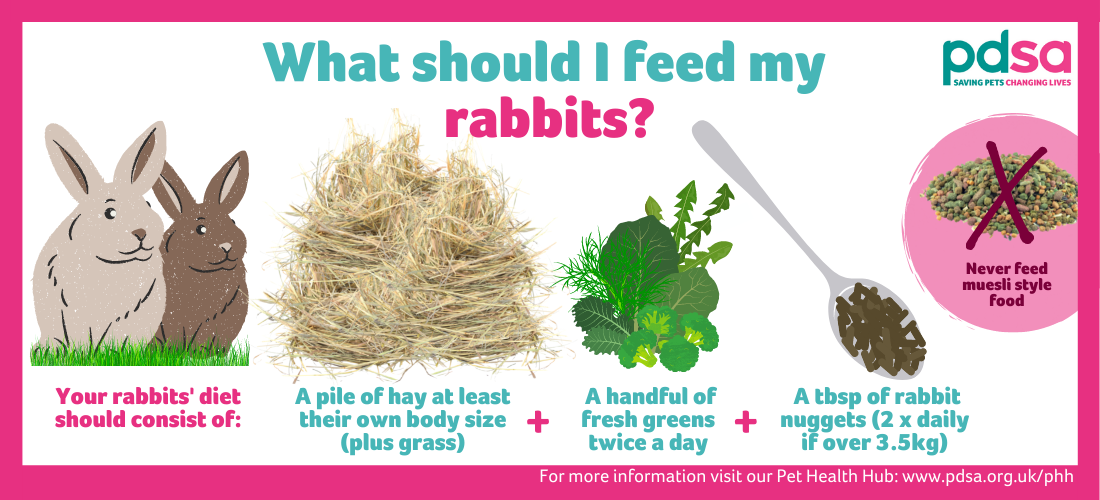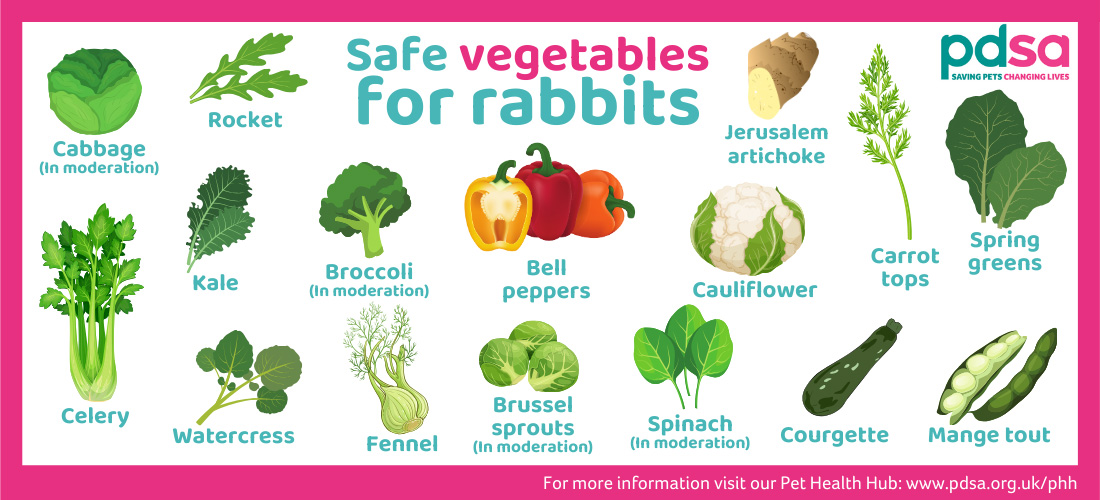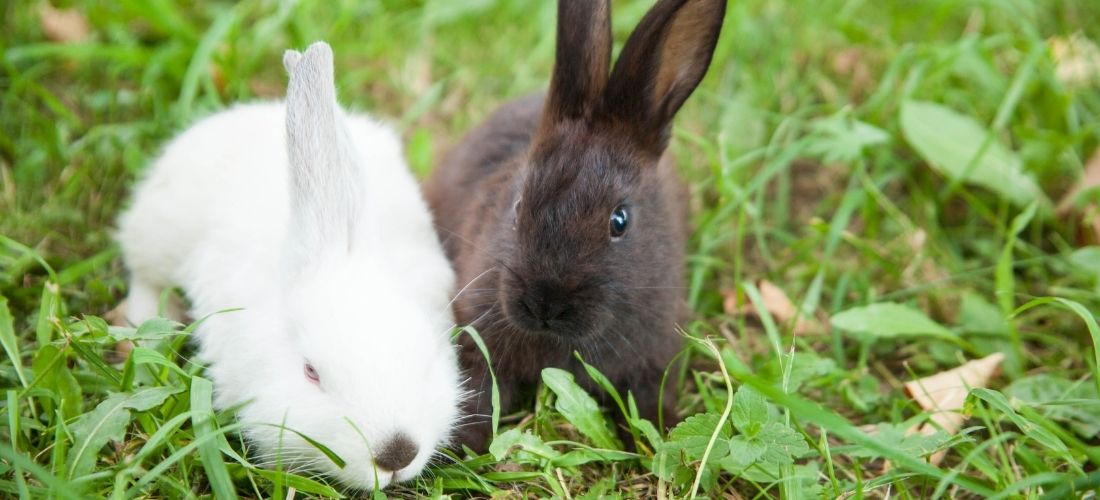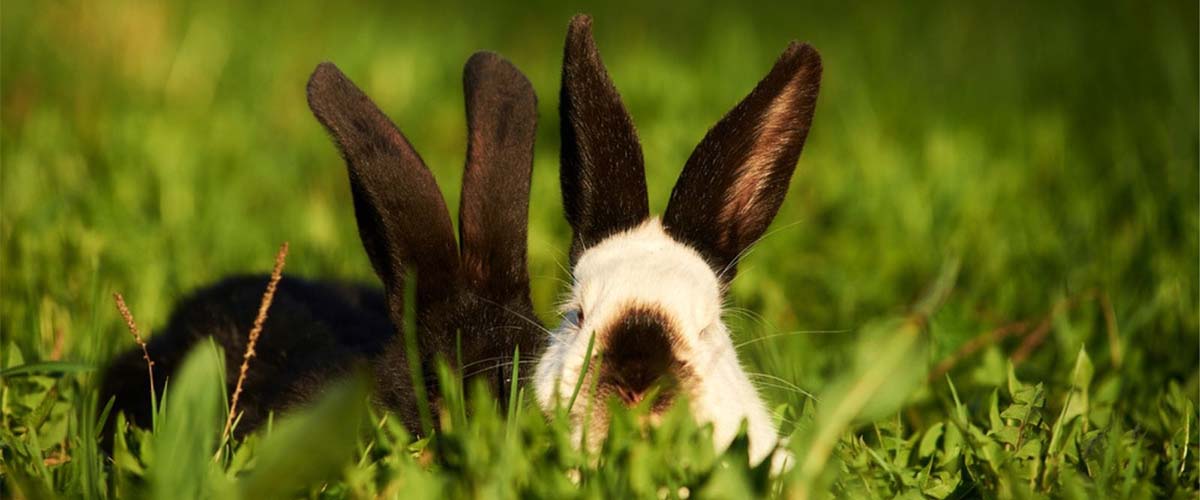Feeding your rabbits
Overview
- Rabbits are herbivores, meaning they eat mostly plants and plant-based foods.
- A balanced diet, high in fibre, is essential for rabbits – feeding them the wrong thing can lead to serious problems such as dental disease and gut stasis.
- If you need to make changes to your rabbits’ diet, it’s important to do so slowly to prevent an upset stomach.

The best diet for your bunnies is one that’s as close to a wild rabbit’s diet as possible. Our vets recommend the following:
- Hay & grass – ideally an unlimited amount, but at least a bundle that’s as big as them each day.
- Fresh food – an adult-sized handful of leafy greens, vegetables and herbs twice daily.
- Nuggets – just one tablespoon of rabbit nuggets once daily (or twice daily if your rabbits weigh over 3.5kg).
- Water – constant access to clean, fresh drinking water.
Hay and grass
Around 85% of your rabbits’ diet should be hay and/or grass – ideally they should be given an unlimited amount, but as an absolute minimum, a bundle at least as big as them per day. It’s important to know the difference between ‘feeding hay’ and ‘bedding hay’ – they are both dried grass, but nutritionally, they are very different. ‘Feeding hay’ is fresher, greener, smells better, tastes better, and has more nutrients in it. ‘Bedding hay’ is dryer, ideal for bedding, but not so great for nibbling, although, it’s not a problem if your rabbits occasionally eat it!
Ideally, your rabbit should also have access to grass. Giving them access to a large grassy space will encourage them to graze (and exercise). If your rabbit is new to fresh grass, introduce it slowly to avoid an upset tummy, and never feed mown grass, as this can make them poorly. Take a look at our advice on rabbit-proofing your garden and providing the ideal home for rabbits.
Greens and fresh veg
Ideally your rabbits should have five to six different types of fresh plant/grass/veg every day to give them a good balance of vitamins and minerals. We’ve listed some of the safe foods for rabbits below:

Safe veg
- Bell peppers (red, yellow and green)
- Broccoli – in moderation (can cause gas)
- Brussel Sprouts – in moderation (can cause gas)
- Cabbage (dark green varieties) – in moderation
- Carrot tops
- Cauliflower including the leaves and stalks
- Celery including the leaves
- Chicory
- Courgette (and the flowers but not the leaves)
- Fennel
- Jerusalem artichoke and leaves
- Kale
- Mange tout
- Salad leaves (such as romaine lettuce) – in moderation
- Rocket
- Spring greens
- Spinach – in moderation
- Watercress
Safe Herbs
- Basil
- Coriander
- Dill
- Mint
- Parsley
- Thyme
Never feed your rabbit anything you can’t identify, or that’s been in contact with pesticides or fertilisers, and always wash fresh food before giving it to them. Check out our advice on how to introduce new foods safely.
Rabbit food (nuggets/pellets)
As well as hay, grass and fresh food, you should give each of your rabbits one tablespoon of nuggets every day (or twice a day if they’re over 3.5kg). Although this seems like a small amount, dried rabbit nuggets are very concentrated, which is why your bunnies don’t need a lot. If your rabbits are fed too many pellets, they will eat less hay, which can lead to health problems such as overgrown teeth and gut stasis. Even nuggets containing long fibre or high levels of fibre should be fed in small quantities. It’s a good idea to scatter the pellets around your rabbits’ home to encourage them to forage.
What about 'muesli-style' mixes?
Our vets don't recommend muesli-style mixes for your rabbits. They might look more ‘fun’ because they’re brightly coloured and contain a mixture of shapes, but rabbits tend to pick out the less healthy, sugary bits, which often leads to health problems such as obesity, overgrown teeth and gut problems.
If you are currently feeding your rabbits a muesli-style food, we recommend slowly switching them to nuggets. You can still vary your rabbits’ diet by giving them a few different types of feeding hay and a number of different fresh foods each day.

Switching your rabbits' diet safely
If want to make a change to your rabbits’ diet, it’s important to do so slowly over a period of 2 – 4 weeks so not to upset their stomach or stop them from eating. Start by mixing a small amount of new food with current food – gradually increase the amount of new food and reduce the amount of old food each day, until they have fully transitioned. Monitor for signs of a stomach upset and slow the process down if you notice any problems. Fresh foods should also be introduced in this way.
If you are introducing hay for the first time it might take them some time to start eating it, but keep persevering – it’s worth it for your rabbits’ long term health. Offer a fresh bundle every day and try different types to tempt them.
Treats
Rabbit treats from pet shops are widely available, but are often high in sugar - which is bad for their teeth, guts and waistline! If you want to give your rabbits something special, we recommend fresh veg, plants, herbs, or a very small amount of fruit. Safe treats for rabbits include (to be given in very small amounts, and avoided in overweight rabbits):
- Squash
- Apples – not the pips, they’re poisonous
- Bananas
- Kiwi fruit
- Melon
- Pears
- Plums
- Strawberries
When you give your rabbit a treat, make sure you adjust their meal size accordingly, so that they don’t have too many calories that day. If your rabbit is already overweight, you could give them treats throughout the day by using some of their nugget or fresh veg allowance, that way you’ll know they aren’t accidently having extra.
Why not turn treats into a game by hiding your bunnies’ favourite veg in a pile of hay for them to dig out?
Why is a proper diet so important for rabbits?
Tooth health
Rabbits’ teeth grow constantly throughout their life, because they have evolved to eat a very high fibre diet that constantly wears their teeth down. If your rabbits’ don’t have enough fibre in their diet, their teeth will overgrow and develop sharp spikes (‘spurs’) that dig into their tongue and cheeks. Read more about dental disease in rabbits.
Gut health
Rabbits also need a high fibre diet to keep their guts moving and prevent a serious condition called ‘gut stasis’.
Are my rabbits the correct weight?
It's a good idea to weigh and check your rabbits’ body shape regularly because being overweight or underweight, is bad for their health. If you’re worried about your rabbits’ weight, body shape or diet, or if you’re not sure you’re feeding them the right amount, speak to your vet for advice.
Read more about checking your rabbit’s weight and body shape.
- What should I do if my rabbit stops eating?
- Do rabbits need food bowls?
- Can rabbits eat fruit?
- Can I feed mown grass to my rabbits?
- Are rabbit nuggets boring?
- Do rabbits love carrots?
- Can rabbits have too much calcium?
- My rabbits are eating their poo – is this normal?
- Can I grow and forage food for my rabbits?
What should I do if my rabbit stops eating?
It’s essential that your rabbits eat regularly throughout the day to keep their guts moving. If your rabbit stops eating, they are at risk of developing a life threatening problem called ‘gut stasis’. Contact your vet immediately if your rabbit stops eating.
Do my rabbits need a food bowl?
No, your rabbits don’t need food bowls – in fact, it’s best to scatter their food so they can forage for it as they would in the wild. If you want to use food bowls, make sure they’re cleaned every day and have at least two (in separate areas), so you can be certain one won’t stop another from eating.
Can rabbits eat fruit?
Yes, it’s fine to feed your rabbits a small amount of fruit every now and again, but it’s high in sugar so shouldn’t be part of their daily diet. Apples, grapes, pears, plums and strawberries are all safe for your rabbits in small amounts (for example, 1/8th of an apple or pear).
Can I feed mown grass to my rabbits?
No, you shouldn’t feed mown grass to your rabbits. Lawn mowers heat up and damage grass, which means it goes off quickly and bacteria can grow on it. If you want to cut grass for your rabbits, use scissors to clip a small amount each day and feed it to your rabbits straight away so it’s as fresh as possible.
Are rabbit nuggets boring?
Rabbit nuggets might look boring to you, but they are perfect for your rabbit. Just like their natural diet of grass, rabbit pellets take a long time to eat and contain lots of fibre, which helps keep their guts moving and teeth short.
Do rabbits love carrots?
Many rabbits love carrots, but they aren’t the healthiest treat because they contain lots of sugar and not much fibre. Just like fruit, carrots are okay in small amounts as an occasional treat.
Can rabbits have too much calcium?
Yes, too much calcium can sometimes cause bladder stones in rabbits. However, calcium is essential for rabbits, and a lack of it can cause tooth and bone problems. As long as you give your rabbit a sensible amount of different vegetables and leaves (see section above), you will naturally give them the right amount of calcium. However, if any of your rabbits have a medical condition that is affected by calcium, such as a urinary or bladder problem, speak to your vet for advice.
My rabbits are eating their poo – is this normal?
Yes – it’s completely normal for your rabbits to eat their poo! It might seem strange, but eating poo is an essential part of digestion for your rabbit – it helps keep their guts healthy and allows them to get all the right nutrients from their food.
Rabbits make two different types of poo, caecotrophs and dry pellets. Caecotrophs are soft, sticky and dark brown. Your rabbit will eat their caecotrophs immediately, which means you won’t see them very often. Once your rabbit has eaten a caecotroph, they process it again, and produce a solid, round pellet. If you’re seeing caecotrophs (dark brown, soft poos) in your rabbits’ cage it’s important to contact your vet – this could be a sign of a health problem.
Can I grow and forage food for my rabbits?
Yes! Rabbits love a variety of fresh food, and you can grow some of these at home, or forage for others. It’s extremely important that you can identify all the plants you grow and forage, because many look similar and some are toxic for rabbits. Safe plants for foraging include:
- Apple leaves and twigs
- Bramble (Rubus fruticosus)/blackcurrant leaves
- Calendula (Calendula officinalis)
- Chamomile (Asteraceae spp)
- Chickweed (Stellaria media)
- Cleavers (goosegrass, stickyweed) (Galium aparine)
- Dandelion (Taraxacum) (only small amounts – it can make them go to the toilet more often)
- Hawthorn (Crataegus monogyna)
- Pear leaves and twigs
- Plum leaves and twigs
- Sow thistle (Sonchus spp)
- Sunflowers
- Strawberry, blackberry or raspberry leaves
- Willow leaves and twigs
- Yarrow (Achillea millefolium) (only small amounts – it can make them go to the toilet more often)
Avoid foraging in areas where there could have been weed killer or pesticides applied, and also where there has been lots of traffic, people or dogs, such as the roadside.

